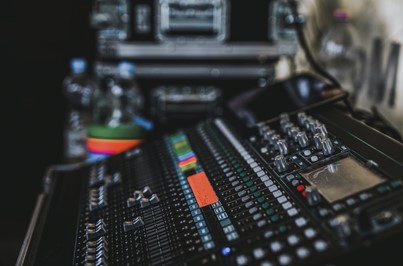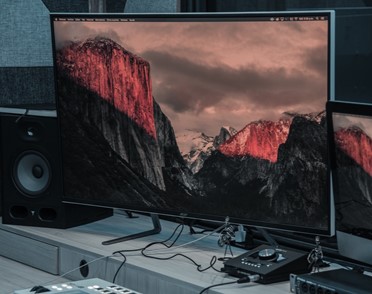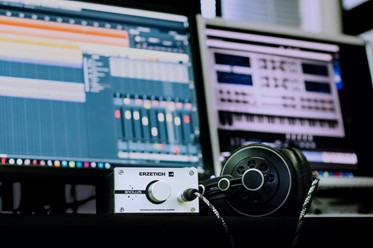Mixing and mastering are two very different processes, used by engineers to make music sound more cohesive and professional. Many music producers/composers will create and arrange music, and then send the recordings off to a professional mixing and mastering service, to get their music sounding the best it can amongst the competition.
There are many differences between mixing and mastering, however, if you’re new to music production, these might not be apparent at first. This can lead to confusion, and with a world of misinformation out there, it can blur the lines between the two and why they’re both very important, separate processes.
In this article, we’ll cover the differences between mixing and mastering, and why it’s important to know for new, budding music producers & engineers.

What Is Mixing?
Mixing is the process of taking a number of tracks, and blending them together, so that they sound more cohesive, and can each individually be heard in their own space.
There is a lot to focus on when mixing, and engineers will often use a range of different tools in order to control the emotion of a track, and get it to sound clear, cohesive and punchy. This can include using tools like EQ, compression, panning, and levelling. And, 99% of the time, these will be applied to almost every track in the mixing process.
Using these tools together, can help to provide balance, in both volume, and the frequency spectrum - helping to prevent frequencies from clashing, allowing instruments to shine over others, and adding thickness, punch or grit to music.
Mixing engineers will also use effects like reverb, delays and distortion to add a more creative feel to tracks, evoking emotion, adding ambience, space, depth and character.
The purpose of a mixing engineer is to take the stems of your recordings, and put them together in such a way that they sound like a final, connected piece, rather than a collection of different instruments.
A good mix can bring your tracks to life, and mixing is responsible for the overall sound and feel of music. Without a good mix, tracks would sound lifeless, dull, and flat - even if they were amazing pieces.
However, although mixing is the most important part of the audio production process, it can’t be used as a saviour for a bad piece of music. But, it can be used to enhance a piece of music that already has potential, and can also be used to save pieces that don’t have the best recordings.
Sometimes mix engineers will replace entire recordings with other sound sources for instance, like drums, to make them punch more and give a better overall feel than the original sound recordings.
The ultimate goal of mixing is to get a great sounding piece across all systems, so mixing engineers will use a range of different audio equipment to ensure a clean, clear listening experience, and a consistent one.
For instance: a mix needs to sound good on high-end studio speakers, as well as apple earbuds - because not everyone is listening in a high-end studio!
This means engineers will listen in an acoustically treated studio, through monitors, headphones, car systems and even use cheap speakers to ensure that all audio niggles are dealt with before final export.
They will also use a range of metering tools to control the stereo field and prevent issues like phase cancellation.
After hours of tweaking to get the right sound, the final track will be exported and sent for mastering.

What Is Mastering?
Mastering is the final stage in the audio production process. It’s where the final touches are added to enhance the sound, create consistency across an album, maximize loudness (without sacrificing dynamics), and get your tracks ready for distribution.
There are 4 main goals of a mastering engineer:
1. To make your track sound better
2. To make it louder
3. To make it sound good across all systems and streaming services
4. To get your track ready for distribution
Where a mixing engineer will take multiple tracks, and blend them into a single, great-sounding track, mastering engineers focus on one stereo track, getting it to sound its best through all systems, and preparing it for distribution.
A mastering engineer will be given a stereo export of the mix, along with some track references, so they can understand the direction the artist wants to go in, and what they want to sound like.
Then, they will use tools like EQ, compression, limiting, stereo enhancement and a lot more, to enhance the track. Mastering engineers will also apply transitions for albums, to make them flow and things like fades.
They will identify problem areas in the frequency spectrum that a mixing engineer might not have been able to hear, and fix them. This is because a mastering engineer’s ears are generally more trained than a mixing engineer’s, meaning they will be able to hear things that they can’t, and be able to solve them.
They will have incredible attention to detail, and a world class studio setup, with some of the finest tuned monitor systems, and analog hardware in the world.
However, the mastering process is fairly limited in what it can do, and a good master can never save a bad mix, or a track with poor recordings. Stuff like plosives, distorted recordings, or poor balance have to be solved in the mixing stage, before being sent to master.
If you have a bad, echo-y vocal recording for instance, it needs to be fixed at the point of the recording, not the final mastering stage.
Mastering is more of a final quality check that ensures your track sounds good on all systems, doesn’t distort, has commercial loudness, and sounds the best it can.
It’s important to note that mastering engineers also offer services like mastering for vinyl and CD. These are necessary to make sure that the balance, and file-type are correct before sending it off for print, and is an especially important process when printing vinyl because, without the proper balance, it can cause playback issues.
The main purpose of a mastering engineer is to enhance the sound of your track, increasing loudness without reducing dynamic range too much. They will also focus on file type and compression, using dithering to reduce quantisation distortion when lowering bit depth, and get your track/album ready for distribution adhering to loudness rules for streaming services like Spotify, & Apple Music.

So, What’s The Difference Between Mixing & Mastering?
Mixing is the process of taking multiple tracks and combining them into one track that sounds cohesive, clear, and punchy. Mastering is where you take the stereo mix, and enhance it using EQ, compression, and limiting, ensuring it sounds good on all systems, services, and is ready for distribution.
The mixing process is different because it gives you control over each individual track, and is focused on slotting instruments into pockets of space, so they can all be heard amongst each other, nothing drowns the other out, and it sounds like one piece, rather than 20 different recordings.
The mastering process is focused on enhancing the final mix, ensuring it sounds good on all systems and services, and is in the right format for distribution. Here you’ll bring your track to commercial volume, enhance the stereo field, and use file compression to tie everything up in a nice bow.
Summary
Mixing and mastering are both essential parts in the audio production process, without one or the other, your music won’t sound good, and simply won’t compete with the stuff that’s already out there. Neither of these can save a bad piece of music, but they are responsible for 100% of how it sounds and can turn a good idea into a hit.
In this article we discussed the differences, so now you should be able to distinguish what each process is, and what it’s for. We hope you enjoyed it!

















_Cropped.png?width=1600&name=02%20(2)_Cropped.png)




















Your Comments :